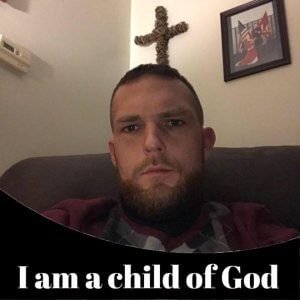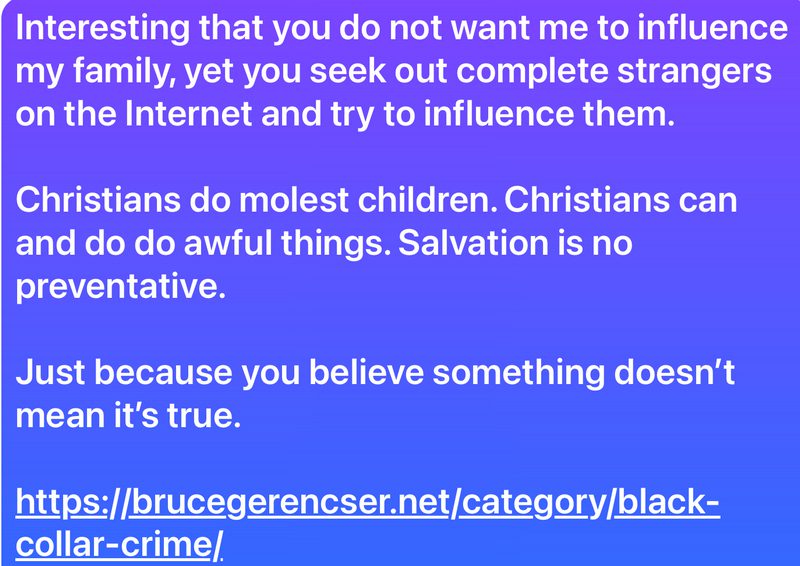
The Black Collar Crime Series relies on public news stories and publicly available information for its content. If any incorrect information is found, please contact Bruce Gerencser. Nothing in this post should be construed as an accusation of guilt. Those accused of crimes are innocent until proven guilty.
In 2023, Dennis Laferty, pastor of Thompson United Methodist Church in Thompson, Ohio, was accused of the sexual abuse of minors: five counts of sexual battery, one count of gross sexual imposition, and one count of sexual imposition. It was alleged that the church covered up Laferty’s crimes. The victims were his two daughters.
The minister of a church in Geauga County has been arrested and is facing multiple criminal charges after he was accused of the sexual abuse of minors.
Dennis Laferty, 37, who is pastor at Thompson United Methodist Church in Thompson Township, is charged with five counts of sexual battery, all third-degree felonies, according to Geauga County Common Pleas Court records. He also is charged with one count of gross sexual imposition, a third-degree felony, and one count of sexual imposition, a misdemeanor. A judge ordered he be held on a $100,000 bond.
Laferty was arrested Friday in Crawford County, the Geauga County Sheriff’s Office says. If Laferty is convicted, he could be sentenced to a maximum of five years on each felony count.
A news release from the sheriff’s office says Laferty is accused of sexually abusing minors beginning in 2019 and continuing until January of this year. Investigators believe there might be more victims.
The Geauga County Maple Leaf added:
The seven-count indictment against Laferty states a county grand jury found between Nov. 30, 2019, and Jan. 30, 2023, Laferty engaged in various acts of sexual misconduct with one or more minors. Specifically, Laferty was charged with five counts of third-degree felony sexual battery, one count of third-degree felony gross sexual imposition involving a person less than 13 years of age and one count of third-degree misdemeanor sexual imposition involving a person 13 years of age or older but less than 16 years old. The third degree felony counts in the indictment each carry a maximum potential sentence of five years in prison.
Laferty, a former staff sergeant in the U.S. Marine Corps, joined TUMC in July 2018 after serving three years as pastor at The United Methodist Church in Nevada, Ohio. He is married and has three daughters, according to his Facebook page.
On March 8, a former member of TUMC contacted the Geauga County Maple Leaf with information that Laferty was removed from his home on or about March 7 and was not allowed to have contact with his family. The person agreed to speak with the Maple Leaf on condition of anonymity.
“The Thompson Methodist Church is trying to cover this up, but the town’s people have a right to know,” the former member said. “The Thompson Police Department along with a few unmarked Chevy Tahoes were at his residence across from Dollar General. They came back later and confiscated some of his belongings.”
The former member was aware of at least one minor victim who is a member of TUMC and said one or more of the church leaders have known about other inappropriate behavior involving Laferty, but have covered it up for years.
“It has torn the church apart,” the former member said. “They don’t want anyone to know, especially the people of Thompson Township or the United Methodist Church District.”
Whether the leaders knew about the sexual battery allegations is unknown, the former member said.
Flaiz said as the investigation is still ongoing, he is unable to comment further on Laferty’s charges at this time.
“An indictment is only a probable cause finding by the grand jury,” his statement said. “A defendant is entitled to a fair trial in which it will be the State’s burden to prove guilt beyond a reasonable doubt.”
A law enforcement source familiar with the investigation, but not authorized to speak publicly, told the Maple Leaf authorities learned of Laferty’s alleged sexual battery through a current TUMC member who was concerned with how the matter was being handled internally at the church.
In addition, the former member said Laferty has a criminal history and provided the Maple Leaf with a copy of a 2012 sentencing entry filed in the Richland County Court of Common Pleas. According to the entry, Laferty admitted to aggravated trafficking in drugs, a third-degree felony. He was ordered to pay a $1,500 fine to the City of Mansfield Police Department and hand over a Kimber .45 semiautomatic handgun to the state of Ohio. He also was ordered to complete a mental health evaluation and treatment program.
The former member claims some church leaders knew of Laferty’s prior conviction but failed to inform the “majority of the hiring committee” before he was hired in July 2018.
In October 2018, Laferty paid to have the 2012 case record sealed so he could get a passport to go to Jerusalem, the former member said, which he did earlier this year, according to his Facebook page.
The Maple Leaf reached out to the lay leader and president of the church, Steve Roessner, for comment on Laferty’s hiring, current status with the TUMC and the criminal allegations. Roessner, who is a tax map manager in the Geauga County Engineer’s Office, did not respond to a text message requesting comment.
The Maple Leaf also reached out to board member Kirk Fowler for comment. Fowler also did not respond.
Thompson United Methodist Administrative Council released the following statement:
We have recently been made aware of very concerning allegations regarding Pastor Dennis Laferty. Please be aware that we are taking matters very seriously and allowing the appropriate authorities to take action. At this time, we ask that you pray for our church and community, and that answers may be brought in a just manner. Please know that we at Thompson United Methodist Church do not condone any form of harm to any person and we care for all our members. To ensure the protection of our congregation and community Dennis has been suspended as Pastor.
The Geauga Maple Leaf reported:
On March 8, a former member of TUMC contacted the Geauga County Maple Leaf with information that Laferty was removed from his home on or about March 7 and was not allowed to have contact with his family. The person agreed to speak with the Maple Leaf on condition of anonymity.
“The Thompson Methodist Church is trying to cover this up, but the town’s people have a right to know,” the former member said. “The Thompson Police Department along with a few unmarked Chevy Tahoes were at his residence across from Dollar General. They came back later and confiscated some of his belongings.”
The former member was aware of at least one minor victim who is a member of TUMC and said one or more of the church leaders have known about other inappropriate behavior involving Laferty, but have covered it up for years.
“It has torn the church apart,” the former member said. “They don’t want anyone to know, especially the people of Thompson Township or the United Methodist Church District.”
Whether the leaders knew about the sexual battery allegations is unknown, the former member said.
….
In addition, the former member said Laferty has a criminal history and provided the Maple Leaf with a copy of a 2012 sentencing entry filed in the Richland County Court of Common Pleas. According to the entry, Laferty admitted to aggravated trafficking in drugs, a third-degree felony. He was ordered to pay a $1,500 fine to the City of Mansfield Police Department and hand over a Kimber .45 semiautomatic handgun to the state of Ohio. He also was ordered to complete a mental health evaluation and treatment program.
The former member claims some church leaders knew of Laferty’s prior conviction but failed to inform the “majority of the hiring committee” before he was hired in July 2018.
In October 2018, Laferty paid to have the 2012 case record sealed so he could get a passport to go to Jerusalem, the former member said, which he did earlier this year, according to his Facebook page.
The Maple Leaf reached out to the lay leader and president of the church, Steve Roessner, for comment on Laferty’s hiring, current status with the TUMC and the criminal allegations. Roessner, who is a tax map manager in the Geauga County Engineer’s Office, did not respond to a text message requesting comment.
The Maple Leaf also reached out to board member Kirk Fowler for comment. Fowler also did not respond.
On March 13, Geauga County Engineer Joe Cattell told the Maple Leaf that Roessner had been placed on paid administration leave pending an investigation into the matter. Cattell explained his office was investigating whether Roessner’s alleged actions or inactions violated any office policies or procedures.
In a March 11 Facebook post, the Thompson UMC Administrative Council stated Laferty has been suspended as pastor.
“We have recently been made aware of very concerning allegations regarding Pastor Dennis Laferty. Please be aware that we are taking matters very seriously and allowing the appropriate authorities to take action,” the council stated. “At this time, we ask that you pray for our church and community, and that answers may be brought in a just manner. Please know that we at Thompson United Methodist Church do not condone any form of harm to any person and we care for all our members.”
The council also stated that “to ensure the protection of our congregation and community” Laferty has been suspended as pastor.
Ten years ago, the Mansfield News Journal wrote a feature story about Laferty, then the pastor of Adario United Methodist Church in Shiloh, Ohio:
Dennis Laferty, 29, admits he joined the Marine Corps to run away from his true vocation.
After 71/2 years, three tours in Iraq and various injuries, Laferty was honorably discharged for medical reasons.
Today, he is the senior pastor of the Adario United Methodist Church.
“I planned to stay in the Corps for 20 years and retire,” he said. “But you can’t run away from God.”
He admits he was still running away when he and his wife, Lisa, moved to Tiro in Crawford County after his discharge.
By habit, he and Lisa attended the United Methodist Church.
“But I was still angry. I had no idea what it was like to be a civilian,” he said. “But a lot of love from a lot of people helped.”
But, Pastor Laferty said, church members such as Elvon Pry “took me under their wings.”
The running was over.
Laferty obtained a degree in criminal justice from North Central State College and looks forward to earning a master’s degree in divinity soon.
After some training, he was assigned to the United Methodist Church in Adario. He and Lisa found a small, comfortable home just down the road from the church.
He is a licensed local pastor who can serve communion, perform marriages and funeral services, as well as conduct baptisms and Sunday services.
He has come a long way from the Marine “gym rat” who served in Iraq three times too many.
A native of Mansfield, Laftery attended the local United Methodist church.
“I knew by the sixth grade that the church was where I belonged. But I didn’t want it,” he said.
He met Lisa at Mansfield Senior High School, and the two were married in between his junior and senior years.
They have three children — Jessica, 9; Abigail, 6; and Rebecca, 2 — plus a friendly dog named Alice.
Laferty joined the Corps right out of high school and was trained in logistics. But every time he went to Iraq, he was on the road with the infantry.
Halfway through his third tour, his vehicle was blown up by a mine.
“The engine was blown almost 500 feet away,” he said.
But of the six men on board, only he was seriously injured — with a concussion and broken ribs.
His real problem was a bone cyst in his right arm. Four operations failed to eliminate it, and he was discharged with disability.
He went from a muscular gym rat to a smaller size.
He also had to face reality. The running was over. God, as he said, was calling.
He doesn’t lift weights any more, but he hopes to lift hearts.
“I was appointed to Adario last July. I needed a new ballgame, and I’ve loved every minute of this.”
His congregation has 71 members, and many are elderly. He knows them all.
This is a busy church with several activities, including free meals for people who need them.
His sermons are taken from a few notes he marks down in his small home office.
“I’m no theologian,” Laftery said.
He takes off from there, hoping to reach the members of his congregation.
While his home office is filled with books on theology and the Bible, a Marine Corps sword sits prominently on a table.
Laferty is a man of God, but always a Marine.
Laferty pleaded guilty to two counts of gross sexual imposition.
A Geauga County pastor has pleaded guilty to sex crimes relating to the abuse of minors.
Under a plea agreement reached Wednesday, Dennis W. Laferty, 37, of Tiro, in Crawford County, could face up to 10 years in prison on the two felony counts of gross sexual imposition to which he pleaded Wednesday, as well as two months in jail on a misdemeanor count of sexual imposition.
He could also be subject to five years of probation upon release and be made to register as a tier II sex offender.
Attorneys have not agreed on a sentence.
Laferty was indicted in March on seven total counts, including five felony counts of sexual battery, one of which was amended to a gross sexual imposition charge in his plea agreement. The other charges were dismissed.
He was released a week after his indictment, after posting 10% of the $100,000 bond ordered in the case.
The offenses to which Laferty pleaded happened between November 2019 and January 2023 in Geauga County, according to his indictment.
In July 2023, Laferty was sentenced to two years in prison for sexually molesting his daughters. Laferty testified:
Your honor, I don’t dispute that I deserve to go to prison, however, I believe that if I went to jail, it would only make a bad situation worse. You’ve read the letters from my daughters and my wife. These are the victims and they do not want me to go to prison,” he told Ondrey. “Instead, they wish to reconcile and move forward. My wife is currently suffering from seizures as a result from having brain surgery and is unable to work. This means they would not be able to pay the mortgage, the car payment or any other bills and lose everything. I ask your honor to show mercy and not sentence me to prison. And if this is your decision, I will continue therapy, I will get a job to support my family and I will do what is required to reconcile with my family, because that is what they want. And I will follow all orders of the court.
The Geauga County Maple Leaf reported:
Geauga County Assistant Prosecutor Christian Bondra saw Laferty’s crimes much differently, recommending a four-year prison term on each count of gross sexual imposition, served consecutively for a total of eight years.
“The state does feel the defendant’s conduct is more serious. It’s our position there was physical harm. We do feel that the digital penetration of a minor would constitute physical harm,” Bondra said. “Counseling services were engaged because of this incident, so the state believes that speaks to the psychological harm and impact to these victims, as well. We also feel the conduct was made more serious given the relationship. (These were) incidents that took place at home, that took place when father was going to pick these children up … there was a familial relationship there that led to and furthered these acts by the defendant.”
Bondra emphasized this was not just one incident with one child, but several incidents with more than one child.
“I would note that … the defendant’s own words of what happened was that he reached his hand into the pants of one of his children and into the pants of another one of his children. What the victims in this case shared was far more gruesome than that, was far more extensive than that,” he said. “That speaks to the defendant’s accountability for these actions, his remorse for these actions. While he sits here today and feels sorry for what he did, we don’t believe he’s still taking full accountability or fully believes everything he did was harmful to these children.”
Bondra acknowledged the letters submitted by the victims, but said it was “somewhat telling” to the state the letters did not really speak of forgiveness, but rather concern for the financial impact of Laferty’s imprisonment.
“The harm and impact to these children is going to continue far past today and into their adult lives. We do believe consecutive sentences are appropriate, your honor,” he concluded. “We believe this was a continuing course of conduct. It was two victims and several different occasions. We would ask the defendant be required to register as a Tier II sex offender.”
Ondrey said he took into consideration Laferty having no prior conviction for offenses of this nature, his service in the marines leading to PTSD, his significant history of mental health challenges, his family’s expressed desire for him to return home as soon as possible, as well as the financial hardship Laferty’s absence would bring his family.
He also considered past sentences for similar offenses, particularly involving father-daughter situations.
The judge said while he does not have sufficient evidence to know whether the victims suffered serious psychological harm, he acknowledges they probably have.
“Lastly, I also have to consider the need for some significant punishment for behaviors that are deemed wholly unacceptable in our society, as you acknowledged today, taking advantage of your relationship with your children and ruining their innocence,” Ondrey said. “No doubt, destroying their faith in you as their father, at least for a period of time.”
Bruce Gerencser, 68, lives in rural Northwest Ohio with his wife of 47 years. He and his wife have six grown children and sixteen grandchildren. Bruce pastored Evangelical churches for twenty-five years in Ohio, Texas, and Michigan. Bruce left the ministry in 2005, and in 2008 he left Christianity. Bruce is now a humanist and an atheist.
Your comments are welcome and appreciated. All first-time comments are moderated. Please read the commenting rules before commenting.
You can email Bruce via the Contact Form.

















